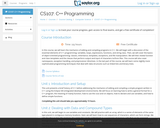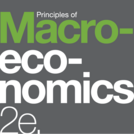
The student will learn the mechanics of editing and compiling a simple program written in C++ beginning with a discussion of the essential elements of C++ programming: variables, loops, expressions, functions, and string class. Next, the student will cover the basics of object-oriented programming: classes, inheritance, templates, exceptions, and file manipulation. The student will then review function and class templates and the classes that perform output and input of characters to/from files. This course will also cover the topics of namespaces, exception handling, and preprocessor directives. In the last part of the course, the student will learn some slightly more sophisticated programming techniques that deal with data structures such as linked lists and binary trees. Upon successful completion of this course, students will be able to: Compile and execute code written in C++ language; Work with the elementary data types and conditional and iteration structures; Define and use functions, pointers, arrays, struct, unions, and enumerations; Write C++ using principles of object-oriented programming; Write templates and manipulate the files; Code and use namespaces, exceptions, and preprocessor instructions; Write a code that represents linked lists and binary trees; Translate simple word problems into C++ language. (Computer Science 107)
- Subject:
- Applied Science
- Computer Science
- Material Type:
- Full Course
- Provider:
- The Saylor Foundation
- Date Added:
- 03/07/2019



